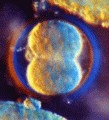
-
Save
After a talk I gave a while ago a man approached me. He told me to think about the “size and condition” of Jesus in the womb when John the Baptist recognized the Person and Personhood of Jesus in the womb.

-
Save
Unfortunately some Christians believe in “pro-choice”; i.e., a woman’s right to determine if she will have an abortion or not. Under a Supreme Court decision, a woman has the legal right to have an abortion; however, it is still morally wrong. As St. Peter proclaimed when testifying before the Jewish High Priest and the Council (Acts 5:29), “We must obey God, not men”.
Some will argue that the fetus is not a human until it is born. The Catholic Church teaches that from the moment of conception, an embryo has the right to life and that it is morally wrong to terminate that life. In addition, the following narrative from the Gospel according to Luke (1:26-56) is worth pondering.

“Elizabeth, filled with the Holy Spirit, said in a loud voice, “You are the most blessed of all women, and blessed is the child that you will bear. Why should this great thing happen to me, that my Lord’s mother comes to visit me? For as soon as I heard your greeting, the baby within me jumped with gladness”.
Consider that after the annunciation by the angel Gabriel, Mary proceeded with haste to visit her cousin Elizabeth. Assuming that Mary reached Elizabeth within a short period of say around 10 days after conception, the baby Jesus was still an embryo*; i.e., just a mass of unrecognizable cells. Yet even though he could not see from within the womb of Elizabeth,

John the Baptist recognized the person of Jesus, the Son of God, within Mary. Mary was pregnant with a human person; even a sixth-month-old fetus, without the benefit of eyesight, was able to make that determination.
“Footnote: From a medical standpoint, a child is not considered a “fetus” until after the eighth (8th) week of pregnancy. Prior to that time, the child is considered an ’embryo’, yet very much human and a person, as Jesus was at that point in the pregnancy.




This Post Has 6 Comments
This is exactly why I personally feel that the Feast of the Incarnation, concomitantly with the Feast of the Annunciation, should be a Holy Day of Obligation in the Catholic Church. Elevating this most important feast day of two extremely important events to a Holy Day of Obligation would, in my humble opinion, elevate in the minds and hearts of Catholics throughout the world, that “The Word was made Flesh, and dwelt among us” did not occur on Christmas day, as so many Catholics and non-Catholics seem to think, but at the very moment of the Incarnation, immediately following the Fiat of Our Mother. Additionally, considering the very moment of Christ’s Conception in His mother’s womb as the exact moment of the beginning of His human existence, perhaps all Catholics would realize that life, indeed, begins at that very moment of conception, as even the infant John the Baptist realized it from his mother’s womb at The Visitation.
Amen Catherine! I have been to both The Church of the Annunciation and Nativity and the holiest place is in Nazareth. While Bethlehem is the seen for a great coming out and celebration, the real work was done about nine months earlier, and in Nazareth!
In the old calendar, the Feast of the Visitation was July 2nd – oddly, an octave after St. John the Baptist’s birthday. With the Novus Ordo calendar, it was moved to May 31st, making it a bit more than 2 months after the Annunciation. I truly wish it had been placed two weeks after the Annunciation, precisely for the pro-life lesson that would teach.
If the Feast of the Visitation was in April it would probably interfere too often with Holy Week/Easter.
A woman has all the rights in the world before having sex knowing that there’s a potential of conceiving when doing it. Once conceived, she already gave up these rights. Now is the time to protect the right to live of an unborn. There’s over 1 million abortions each year in U.S. alone. Incest, medically needed, or rape aren’t even making up 1% of abortion cases. Correct me i’m wrong with this statistic.
Catherine, thank you for your wonderful comment. I very much agree!
Comments are closed.